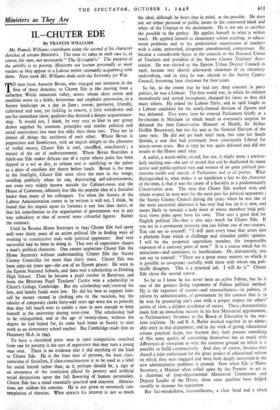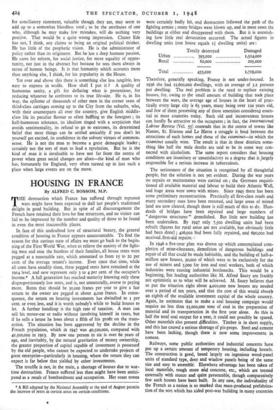Ministers as They Are
II.-CHUTER EDE
By FRANCIS WILLIAMS Mr. Francis Williams contributes today the second of his character sketches of certain Ministers. The view he takes in each case is, of course, his own, not necessarily " The apectator's." The purpose of the articles is to portray Ministers not known personally to most readers as they appear to a Labour writer intimately acquainted with them. Next week Mr. Williams deals with the Secretary for War.
TO turn from Aneurin Bevan, who engaged our attention in the first of these sketches, to Chuter Ede is like moving from a turbulent Welsh mountain valley, across whose skies storm and sunshine move in a fickle, boisterous and emphatic procession, to a Surrey landscape on a day in June ; serene, pervasive, friendly, cultivated and neat, yet holding in reserve, a little withdrawn and not for immediate show, qualities that demandu deeper acquaintance- ship. It would not, I think, be very easy to find in any group drawn together by common principles and similar political and social convictions two men less alike than these two. They are in alMost all things the antithesis of each other. Where Bevan is pugnacious and flamboyant, with an impish delight in the pleasures of verbal excess, Chuter Ede is cool, unruffled, conciliatory ; a master of the art of understatement. Where Bevan flourishes a battle-axe Ede makes delicate use of a rapier whose point has been dipped in a wit as dry, as urbane and as satisfying to the palate as a glass of excellent dry sherry before lunch. Bevan is the man in the limelight, Chuter Ede most often the man in the wings, avoiding publicity when he can, deprecating self-advertisement, not even very --widely known outside the Cabinet-room and the House of Commons, infinitely less like the popular idea of a Socialist leader than many of his colleagues. Yet when the history of the Labour Administration comes to be written it will not, I think, be found that his impact upon its fortunes is any less than theirs, or that his contribution to the organisation of government was in any way subsidiary to that of several more colourful figures. Rather the contrary.
Until he became Home Secretary in 1945 Chuter Ede had spent well over thirty years of. an active political life in finding ways of working to constructive ends with political opponents. And very successful had he been in doing it. That sort of experience shapes a man's political character. One cannot appreciate Chuter Ede the Home Secretary without understanding Chuter Ede the Surrey County Councillor for more than thirty years. Chuter Ede was born sixty-six years ago—the son of an Epsom grocer. He went to the Epsom National Schools, and then won a scholarship to Dorking High School. Then he became a pupil teacher in Battersea, and from the Battersea Pupil Teachers' Centre won a scholarship to Christ's College, Cambridge. But the scholarship only icovered his fees, and family funds were low. He did his best to support him- self by money earned in clerking jobs in the vacation, but the salaries of temporary clerks forty-odd years ago were not so princely that they left much over to enable a man to save enough to keep himself at the university during term-time. The scholarship had to be relinquished, and at the age of twenty-three, without the degree he had hoped for, he came back home to Surrey to start work as an elementary school teacher. But Cambridge made him an Honorary M.A. in 1943.
To have a cherished prize won in open competition snatched from one by poverty is the sort of experience that may turn a young man sour. There is no evidence that it did anything of the kind to Chutes Ede. He is the least sour of persons, the least class- conscious of Socialists, if class-consciousness is to be used as a label for social hatred rather than, as it perhaps should be, a sign of an awareness of the restriction placed by poverty and artificial social distinctions upon the full flowering of human personality. Chutes. Ede has a mind essentially practical and concrete. Abstrac, tions are seldom- his.concern. He is not given to overmuch con- templation of theories. What attracts his interest is not so much
the ideal, although he bears that in mind, as the possible. He does not see either personal or public issues in the contrasted black and white of the Utopian or the doctrinaire. He is not one to sacrifice the possible to the perfect. He applies himself to what is within reach. He applied himself to elementary school teaching, to educa- tional problems and to the professional organisation of teachers with a calm, unhurried, altogether unembittered, competence. He became a considerable figure in the councils of the National Union of Teachers and president of the Surrey County Teachers' Asso- ciation. He was elected to the Epsom Urban District Council in 1908, became very shortly afterwards chairman of its electricity undertaking, and in 1914 he was elected to the Surrey County Council, becoming later chairman for four-years.
So far, to the extent that he had any deep concern in party politics, he was a Liberal. The first world war, in which he enlisted immediately and served throughout, changed his views as they did many others. He joined the Labour Party, and in 1918 fought as a Labour candidate for the newly-formed division of Epsom and was defeated. Five years later he entered Parliament briefly at a by-election in Mitcham (at which much to everyone's surprise he defeated the then Conservative Minister of Health, Sir Arthur Griffith Boscawen), but lost his seat at the General Election of the same year. He did not get back until 1929, this time for South Shields, a seat that had previously been consistently Liberal for ninety-seven years. But in 1931 he was again defeated and did not return to the House until 1935.
A useful, a worth-while, record, but not, it might seem, a particu- larly exciting one—the sort of record that can be duplicated by many active and public-spirited men and women of no great political pre- tensions inside and outside of Parliament and in all parties. What distinguished it, what makes it so significant a key to the character of the man, is that it was the career of a Socialist in a predominantly Conservative area. The men that Chuter Ede worked with and whose respect he won were for the most part his political opponents ; the Surrey County Council during the years when he was one of the most successful chairmen it has ever had was (as it is now, and seems likely to remain) a body most of whose members hold poli- tical views poles apart from his own. That says a great deal for English political life—but it also says much for Chuter Ede. If you are in a permanent minority you can follow one of two courses. You can say to yourself : " I will turn every issue that arises into a platform from which to challenge and stimulate public opinion. I will be the perpetual opposition member, the irrepressible exponent of a contrary point of view." It is a course which has its attractions—and sometimes its justifications. Or, alternatively, you can say to yourself : " There are a great many matters on which it is possible to co-operate usefully, with those with whom one poli- tically disagrees. This is a practical job. I will do it." Chutes Ede chose the second course.
So far as I know he has never been an active Fabian, but he is one of the greatest living exponents of Fabian political method. He is the exponent of reason—and reasonableness—in politics, of reform by administration, of government by the consent that is to be won by presenting one's case with a proper respect for others' points of view, a diligent avoidance of excess. These characteristics made him an immediate success in his first Ministerial appointment, as Parliamentary Secretary to the Board of Education in the war- time coalition. He and R. A. Butler, worked together in an admir- able unity in that department, and in the work of giving educational reform practical shape, just because they both possess something of this same quality of concerning themselves not so much with differences of viewpoint as with the common ground on which it is possible to build constructively. And also, of course, because they shared a joint enthusiasm for the great project of educational refortn on which they were engaged and were both deeply interested in the new administrative problems it created. Now when Ede is Home Secretary, a Minister often called upon by the Premier to act as a chairman of inter-departmental Ministerial Committees and Deputy Leader of the House, these same qualities have helped steadily to increase his reputation.
But fair-mindedness, reasonableness, a clear head and a talent for conciliatory statement, valuable though they are, may seem to add up to a somewhat bloodless total ; to be the attributes of one who, although he may make few mistakes, will do nothing very positive. That would be a quite wrong impression. Chuter Ede has not, I think, any claims to being an original political thinker. He has little of the prophetic vision. He is the administrator of policy rather than its originator. But he has a deep humane passion. He cares for reform, for social justice, for more equality of oppor- tunity, not just in the abstract but because he sees them always in terms of human beings. It is that humanity which accounts more than anything else, I think, for his popularity in the House.
Yet over and above this there is something else less tangible, less easy to express in words. How shall I put it ? A quality of humorous sanity, a gift for deflating what is pretentious, for reducing whatever he confronts to its true life-size. He is, in his Way, the epitome of thousands of other men in the corner seats of third-class carriages coming up to the City from the suburbs, who, with their counterparts all over the country, give English middle- class life its peculiar flavour so often baffling to the foreigner ; its half-humorous tolerance, its idealism tinged with a scepticism that avoids sentimentality, its refusal to go to extremes, its determined belief that most things can be settled amicably if you don't let yourself get excited, its confidence in the solvent virtues of common- sense. He is not the man to become a great demagogic leader ; certainly not the sort of man to lead a revolution. But he is the kind of man it is invaluable to have not far from the centre of power when great social changes are afoot—the kind of man who has, fortunately for England, very often turned up in just such a place when large events are on the move.



































 Previous page
Previous page